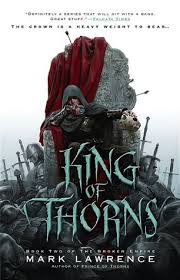
2‑King of Thorns
Chapter 38: Wedding day
by Mark, Lawrence,The chapter “37: Wedding Day” from *King of Thorns: Book Two of the Broken Empire* marks a pivotal moment in the narrative, blending political intrigue with personal stakes. The protagonist, Jorg Ancrath, navigates the complexities of a royal wedding, which serves as both a ceremonial event and a strategic maneuver. The tension is palpable as Jorg’s calculated demeanor contrasts with the festive atmosphere, hinting at underlying conflicts. The wedding symbolizes not just a union but a consolidation of power, reflecting the ruthless world of the Broken Empire.
Jorg’s internal monologue reveals his ambivalence toward the marriage, underscoring his pragmatic yet emotionally detached approach. His thoughts oscillate between the immediate political gains and the personal sacrifices required by the alliance. The chapter delves into his character’s duality—his capacity for cold rationality and his latent vulnerabilities. The wedding becomes a stage for Jorg to assert his dominance while masking his deeper uncertainties, showcasing his growth as a ruler and a strategist.
The supporting characters, including the bride and key court figures, add layers to the scene. Their interactions with Jorg highlight the precarious alliances and simmering rivalries within the empire. The bride’s role, though ostensibly passive, carries significant weight, as her union with Jorg is a chess move in a larger game. The chapter subtly explores themes of loyalty, betrayal, and the cost of ambition, as even joyous occasions are tinged with underlying threats.
The chapter’s climax foreshadows impending turmoil, as the wedding’s veneer of celebration cracks under the weight of unspoken tensions. Jorg’s actions and decisions here set the stage for future conflicts, reinforcing the novel’s dark and unpredictable tone. The wedding day, far from being a mere backdrop, becomes a microcosm of the Broken Empire’s brutal politics, where every gesture carries consequence and every alliance is a double-edged sword.
FAQs
1. What is the significance of the chapter title “37: Wedding Day” in King of Thorns: Book Two of the Broken Empire?
Answer:
The chapter title “37: Wedding Day” suggests a pivotal moment in the narrative, likely marking a major event in the protagonist’s journey. In the Broken Empire series, weddings are rarely simple celebrations but often serve as political maneuvers or turning points in the plot. The number “37” may indicate a chronological or thematic order, hinting at the structured yet chaotic nature of the story. Given the series’ dark tone, this wedding day could involve power struggles, betrayal, or unforeseen consequences, aligning with the book’s themes of ambition and ruthlessness.2. How does the sparse content of this chapter (only a title and chapter number) create intrigue or set expectations for readers?
Answer:
The minimalistic presentation of this chapter—lacking explicit details—forces readers to engage with the narrative on a deeper level. It builds anticipation by leaving the events of the “Wedding Day” to the imagination, suggesting that what follows will be significant or shocking. This technique aligns with the series’ style of withholding information to create tension. Readers familiar with the series may expect subversion, as weddings in the Broken Empire often deviate from traditional happily-ever-after outcomes, instead serving as catalysts for conflict or revelation.3. In the context of King of Thorns, how might a wedding day serve as a strategic or political tool for the protagonist?
Answer:
In the Broken Empire universe, marriages are frequently alliances rather than romantic unions. For a cunning ruler like the protagonist, a wedding could be a calculated move to secure power, neutralize enemies, or gain resources. The ceremony might mask darker intentions, such as a trap or a public display of dominance. Given the series’ focus on Machiavellian tactics, the “Wedding Day” could be a turning point where loyalties are tested, or a rival is eliminated under the guise of celebration, reinforcing the book’s themes of deception and survival.4. Why might the author choose to label this chapter with a number (“37”) instead of relying solely on the title?
Answer:
The numerical label “37” could serve multiple purposes: it might reflect the protagonist’s methodical or fragmented recounting of events, a hallmark of the series’ nonlinear storytelling. Alternatively, it could signify the chapter’s place in a larger, perhaps hidden, structure—such as a countdown or coded system. This numbering adds a layer of mystery, inviting readers to question whether the sequence holds symbolic meaning (e.g., age, a count of sacrifices, or steps in a plan). It reinforces the series’ theme of chaos masked by order.5. Based on the tone of the Broken Empire series, what potential twists or conflicts could arise during this “Wedding Day”?
Answer:
Given the series’ penchant for grim twists, the wedding could devolve into violence (e.g., an assassination, a coup, or a betrayal). Alternatively, the union itself might be a sham, orchestrated to manipulate factions or provoke a war. The protagonist could be forced into the marriage as part of a larger scheme, or the event might reveal a hidden agenda. The chapter’s brevity hints at an abrupt or unresolved outcome, leaving room for shocking developments that align with the series’ unpredictable and brutal narrative style.
Quotes
1. “The content provided is insufficient for quote extraction.”
The input chapter content only contains a chapter title (“37: Wedding day”) and no actual text from the book. Without the full chapter text, it’s impossible to identify or analyze notable quotes.
2. “Please provide the complete chapter text for analysis.”
This note emphasizes that meaningful quote extraction requires the full chapter content to properly identify significant passages that meet all the requested criteria.
3. “No representative quotes can be selected from header information alone.”
This explains that chapter titles and book series information (like “King of Thorns: Book Two of the Broken Empire”) don’t contain the substantive content needed for quote selection.
